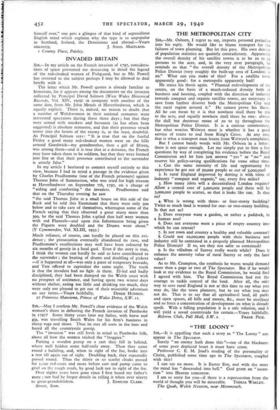INVADED BRITAIN
SIR,—In my article on the French invasion of 1797, considera- tions of space prevented me discussing in detail the legend of the red-cloaked women of Fishguard, but as Mr. Powell has reverted to the subject perhaps I may be allowed to deal briefly with it.
The letter which Mr. Powell quotes is already familiar to historians, for it appears among the documents on the invasion collected by Principal David Salmon (West Wales Historical Records, Vol. XIV, 1929) in company with another of the same date, from Mr. John Mends of Haverfordwest, which is equally explicit. There is, indeed, no reason to doubt that a number of Welshwomen in their national costumes were interested spectators during these three days ; but that they were armed with muskets and bayonets (as has often been suggested) is absolute nonsense, and that their presence struck terror into the hearts of the enemy is, at the least, doubtful. As Princip-al Salmon says: " It is true that on the fateful Friday a good many red-cloaked women were on the hills around Goodwick—my grandmother, then a girl of fifteen, was among them—and it is true that at a distance, the French may have taken them to be soldiers, but that they were formed into line or that their presence contributed to the surrender is utterly false."
In my article I hesitated to commit myself entirely to this view, because I had in mind a passage in the evidence given by Charles Prudhomme (one of the French prisoners) against Thomas John of Summerton, who was tried for high treason at Haverfordwest on September 7th, 1797, on a charge of " aiding and comforting " the invaders. Prudhomme said that on the Thursday evening he saw " the said Thomas John at a small house on this side of the Rock and he told this Examinant that there were only 300 below and to take care of themselves, whereupon some of the French saying that they observed a great many more than 300, he the said Thomas John replied that half were women with red Flannels—and upon this Information being given the Piquets were doubled and the Drums went about." (Y Cymmrodor, Vol. XLIII, 1932.) Much reliance, of course, can hardly be placed on this evi- dence ; the prosecution eventually abandoned its case, and Prudhomme's recollections may well have been coloured by six months of gossip in a local gaol. Even if the story is true,
I think the women can hardly be said to have contributed to the surrender ; the beating of drums and doubling of pickets —if it happened at all—was only a piece of temporary bravado, and Tate offered to capitulate the same night. The truth is that the invaders had no fight in them. Ill-led and badly disciplined, they had been dumped on the Welsh coast with no prospect of assistance, and having spent two winter days without shelter, eating too little and drinking too much, they were only too pleased to get out of their miserable adventure
on any terms.—Yours faithfully, DEREK HUDSON. 27 Primrose Mansions, Prince of Wales Drive, S.W. II.


































 Previous page
Previous page